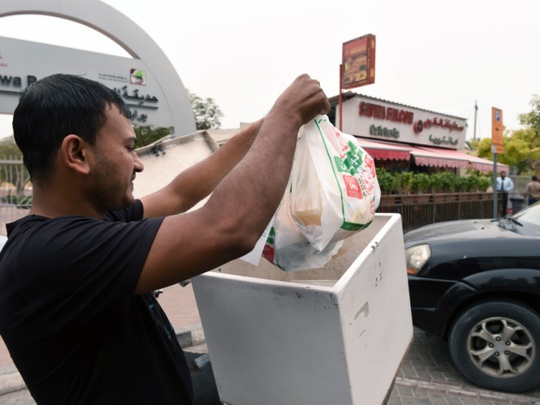
Dubai: For many in the UAE, the country’s fast-paced culture, long work schedules and high salaries mean one thing: ordering lots of takeaway meals.
In the UAE, around three in four people order takeaway food at least once a week, according to a report by advisory firm KPMG.
“I work 13 to 14-hour days sometimes and ordering is just easier,” says the entrepreneur. He usually orders Japanese food, salads and sandwiches.
“In some respects, it is also cheaper when you actually calculate all of the ingredients that go into making a meal.”
Takeaways are also a good — and often default — option when you can’t cook.
Back in those days, she and her sister would order at least two times a day — salads and sandwiches on weekdays, and burgers and fries on weekends.
She now lives in New Zealand. “No one really orders food delivery here,” she adds.
Years ago, restaurants would market themselves by leaflets slipped under doors.
But nowadays, thanks to eatery apps and sites stocked with contact information, location, reviews, pricing and menus, there’s never been a better time to order a meal.
And for those who hate struggling through call centres and phone conversations, many apps and restaurants now offer an online ordering system.
Constant ordering
Data collected from one platform, Talabat, which lists 1,500 restaurants and boasts of having 600,000 users, reveals that 7.5 per cent of UAE-based customers order more than once a day.
According to the Talabat data, Emiratis, Jordanians and Filipinos form the largest numbers of users. The average spend per meal is Dh73.
“The majority of customers spend over Dh300 a month ordering food,” said Talabat’s chief executive, Abdul Hamid Al Omar.
A rival platform is Zomato, which operates in 23 countries. The firm claims that in the UAE, the average user orders twice a week. Several hundred, meanwhile, place an order every single day.
The platform claims similar per-order spends — Dh75 on an average — and claims that people spend Dh500 a month on takeaways.
And the numbers of hungry eaters who order online are only set to grow.
Last year in the UAE, Zomato saw close to a 650 per cent increase in orders, according to a spokeswoman.
There’s plenty of other firms jostling to tap into the growing demand. Food delivery services Deliveroo and Uber Eats, which launched in Dubai in 2015 and last September, respectively, have partnered with restaurants across the city. Both firms constantly run offers and promotions to attract customers.
In some of the city’s further outlying communities, ordering food takes a certain amount of planning.
Far away in Al Ghadeer community — which is technically located in Abu Dhabi emirate but sits right on the Dubai border — many restaurants simply won’t deliver.
“The minimum delivery amount is Dh100, we order extra so it meets the delivery requirement plus takes care of our meal for the following morning or evening.”
Food on demand
Some have got the business of takeaway orders down to a science.
“I can jump on my phone and use one of many apps to order whatever I want on my way home from the office,” said Kahler, the entrepreneur.
“Time it right and dinner will arrive at my door just after I get in my villa. Effortless.”
“People nowadays don’t have time to cook, even if they do they are bored to do so,” he says.
“Dubai is a city which is mushrooming with new restaurants every week. There is a something for everyone, [and] food gets to your doorstep in minutes.”
Restaurants often charge a delivery fee and almost always have minimum order rates.
“Even if it is a little pricey people prefer it as you don’t have to do the dishes at the end of the day.”
BOX: In numbers: Takeaway orders
3 in 4: The number of people living in the UAE who order takeaway food at least once a week
7.5 per cent: The proportion of users who order meals more than twice a day on food ordering platform Talabat
Dh73-75: The average spend per order on Talabat and Zomato, respectively
Dh300-500: The average spend per month on takeaways,











